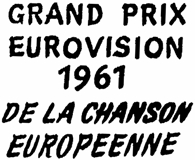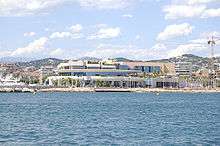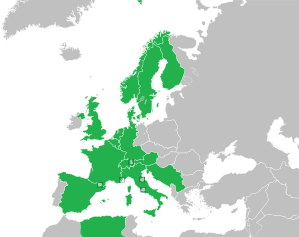Eurovision Song Contest 1961
The Eurovision Song Contest 1961 was the 6th edition of the annual Eurovision Song Contest. It took place in Cannes, France, following Jacqueline Boyer's win at the 1960 contest in London, United Kingdom with the song "Tom Pillibi". It was the second time that France had hosted the contest; the first being in 1959 - also in Cannes. The contest was held at Palais des Festivals et des Congrès on 18 March 1961 and was the first to take place on a Saturday night, a tradition that has continued into modern times. The show was hosted by Jacqueline Joubert.
| Eurovision Song Contest 1961 | |
|---|---|
 | |
| Dates | |
| Final | 18 March 1961 |
| Host | |
| Venue | Palais des Festivals et des Congrès Cannes, France |
| Presenter(s) | Jacqueline Joubert |
| Conductor | Franck Pourcel |
| Directed by | Marcel Cravenne |
| Host broadcaster | Radiodiffusion-Télévision Française (RTF) |
| Interval act | Tessa Beaumont and Max Bozzoni |
| Website | eurovision |
| Participants | |
| Number of entries | 16 |
| Debuting countries | |
| Returning countries | None |
| Non-returning countries | None |
Participation map
| |
| Vote | |
| Voting system | Ten-member juries distributed 10 points among their favourite songs. |
| Nul points | None |
| Winning song | "Nous les amoureux" |
Sixteen countries participated in the contest - three more than in the previous edition; Finland, Spain and Yugoslavia all made their début this year.
The winner was Luxembourg with the song "Nous les amoureux", performed by Jean-Claude Pascal, written by Maurice Vidalin, and composed by Jacques Datin. This was Luxembourg's first victory in the contest, with the United Kingdom finishing in second place for the third consecutive year.
As the contest overran its allocated time, and the show was being broadcast live, the winning song's reprise was not shown in the UK.[1]
Location

The event took place in Cannes, France, with the venue being the original building of Palais des Festivals et des Congrès, after France got the right to host this edition of the Eurovision Song Contest for winning its previous 1960 edition with the song "Tom Pillibi" performed by Jacqueline Boyer.
Cannes, a city located on the French Riviera, is a busy tourist destination and known worldwide for hosting the annual Cannes Film Festival, with the Palais des Festivals et des Congrès also hosting the Film Festival. The original building was built in 1949 and was located on the boulevard of Promenade de la Croisette, on the present site of the JW Marriott Cannes. It also hosted the 1959 edition of the Eurovision Song Contest.
Format
Jacqueline Joubert presented the show, having already done so two years earlier in 1959. The stage used for the 1961 Contest was notably larger than in previous years and was decorated with flowers. It is noticeable that during the voting, Luxembourg gave the UK eight points, and Norway also gave Denmark eight points. It was the largest number of points given to a country by a single jury since 1958, when Denmark provided France with nine points. Such a high number of points obtained by a country would not be achieved until 1970, when Ireland would receive nine points from Belgium.[1]
Participating countries
A total of sixteen countries took part in the Contest, including the three debuting countries: Finland, Spain, and Yugoslavia.[1]
Conductors
Each performance had a conductor who maestro the orchestra.[2][3]
.svg.png)



.svg.png)





.svg.png)





Returning artists
The contest saw the return of two artists this year with the Belgian representative, Bob Benny, who previously participated in the 1959 contest; and Nora Brockstedt, who performed for Norway in 1960.[1]
Results
Scoreboard
Each country had 10 jury members who each awarded 1 point to their favourite song.
| Voting results | ||||||||||||||||||
|---|---|---|---|---|---|---|---|---|---|---|---|---|---|---|---|---|---|---|
| Spain | 8 | 1 | 2 | 2 | 1 | 1 | 1 | |||||||||||
| Monaco | 6 | 1 | 1 | 3 | 1 | |||||||||||||
| Austria | 1 | 1 | ||||||||||||||||
| Finland | 6 | 2 | 2 | 1 | 1 | |||||||||||||
| Yugoslavia | 9 | 1 | 1 | 1 | 2 | 1 | 3 | |||||||||||
| Netherlands | 6 | 2 | 1 | 1 | 2 | |||||||||||||
| Sweden | 2 | 2 | ||||||||||||||||
| Germany | 3 | 1 | 1 | 1 | ||||||||||||||
| France | 13 | 2 | 1 | 4 | 1 | 1 | 2 | 2 | ||||||||||
| Switzerland | 16 | 2 | 2 | 4 | 2 | 1 | 2 | 2 | 1 | |||||||||
| Belgium | 1 | 1 | ||||||||||||||||
| Norway | 10 | 1 | 5 | 1 | 2 | 1 | ||||||||||||
| Denmark | 12 | 8 | 2 | 1 | 1 | |||||||||||||
| Luxembourg | 31 | 3 | 1 | 1 | 1 | 5 | 1 | 1 | 5 | 3 | 4 | 4 | 2 | |||||
| United Kingdom | 24 | 1 | 8 | 1 | 1 | 7 | 3 | 3 | ||||||||||
| Italy | 12 | 4 | 4 | 1 | 1 | 1 | 1 | |||||||||||
Broadcasters, commentators and spokespersons
Spokespersons
Listed below is the order in which votes were cast during the 1961 contest along with the spokesperson who was responsible for announcing the votes for their respective country.[5]





.svg.png)





.svg.png)



.svg.png)
Broadcasters and commentators
Each national broadcaster also sent a commentator to the contest, in order to provide coverage of the contest in their own native language.
| Country | Broadcaster(s) | Commentator(s) | Ref(s) |
|---|---|---|---|
| ORF | Wolf Mittler | [5] | |
| RTB | French: Robert Beauvais | [5][9] | |
| BRT | Dutch: Nic Bal | [5] | |
| Danmarks Radio TV | Sejr Volmer-Sørensen | [5] | |
| Suomen Televisio and Yleisradio | Aarno Walli | [5] | |
| RTF | Robert Beauvais | [5][9] | |
| Deutsches Fernsehen | Wolf Mittler | [5] | |
| Programma Nazionale | Corrado Mantoni | [5] | |
| Télé-Luxembourg | Robert Beauvais | [5][9] | |
| Télé Monte Carlo | [5][9] | ||
| NTS | Piet te Nuyl | [5][10] | |
| NRK and NRK P1 | Leif Rustad | [5] | |
| TVE | Federico Gallo | [5] | |
| Sveriges TV and SR P1 | Jan Gabrielsson | [5][11] | |
| TV DRS | German: Theodor Haller | [5] | |
| TSR | French: Robert Beauvais | [5][9] | |
| BBC TV | Tom Sloan | [5][3] | |
| BBC Light Programme | Pete Murray | ||
| Televizija Beograd | Serbo-Croatian: Ljubomir Vukadinović | [5] | |
| Televizija Zagreb | Serbo-Croatian: Gordana Bonetti | [5] | |
| Televizija Ljubljana | Slovene: Tomaž Terček | [5] |
References
- "Eurovision Song Contest 1961". EBU. Retrieved 13 February 2009.
- "And the conductor is..." Retrieved 10 July 2018.
- Roxburgh, Gordon (2012). Songs for Europe: The United Kingdom at the Eurovision Song Contest. Volume One: The 1950s and 1960s. Prestatyn: Telos Publishing. pp. 254–264. ISBN 978-1-84583-065-6.
- "Eurovision Song Contest 1961". The Diggiloo Thrush. Retrieved 4 March 2012.
- "Eurovision 1961 - Cast and Crew". IMDb. Retrieved 17 July 2020.
- Dyrseth, Seppo (OGAE Norway)
- "Infosajten.com". Archived from the original on 18 July 2012. Retrieved 10 August 2012.
- "Greetje vanavond nummer zes", Nieuwe Leidsche Courant, 18 March 1961
- Christian Masson. "1961 - Cannes". Songcontest.free.fr. Retrieved 10 August 2012.
- "Nederlandse televisiecommentatoren bij het Eurovisie Songfestival". Eurovision Artists (in Dutch).
- Thorsson, Leif (2006). Melodifestivalen genom tiderna ["Melodifestivalen through time"]. Stockholm: Premium Publishing AB. p. 34. ISBN 91-89136-29-2.
External links
| Wikimedia Commons has media related to Eurovision Song Contest 1961. |

